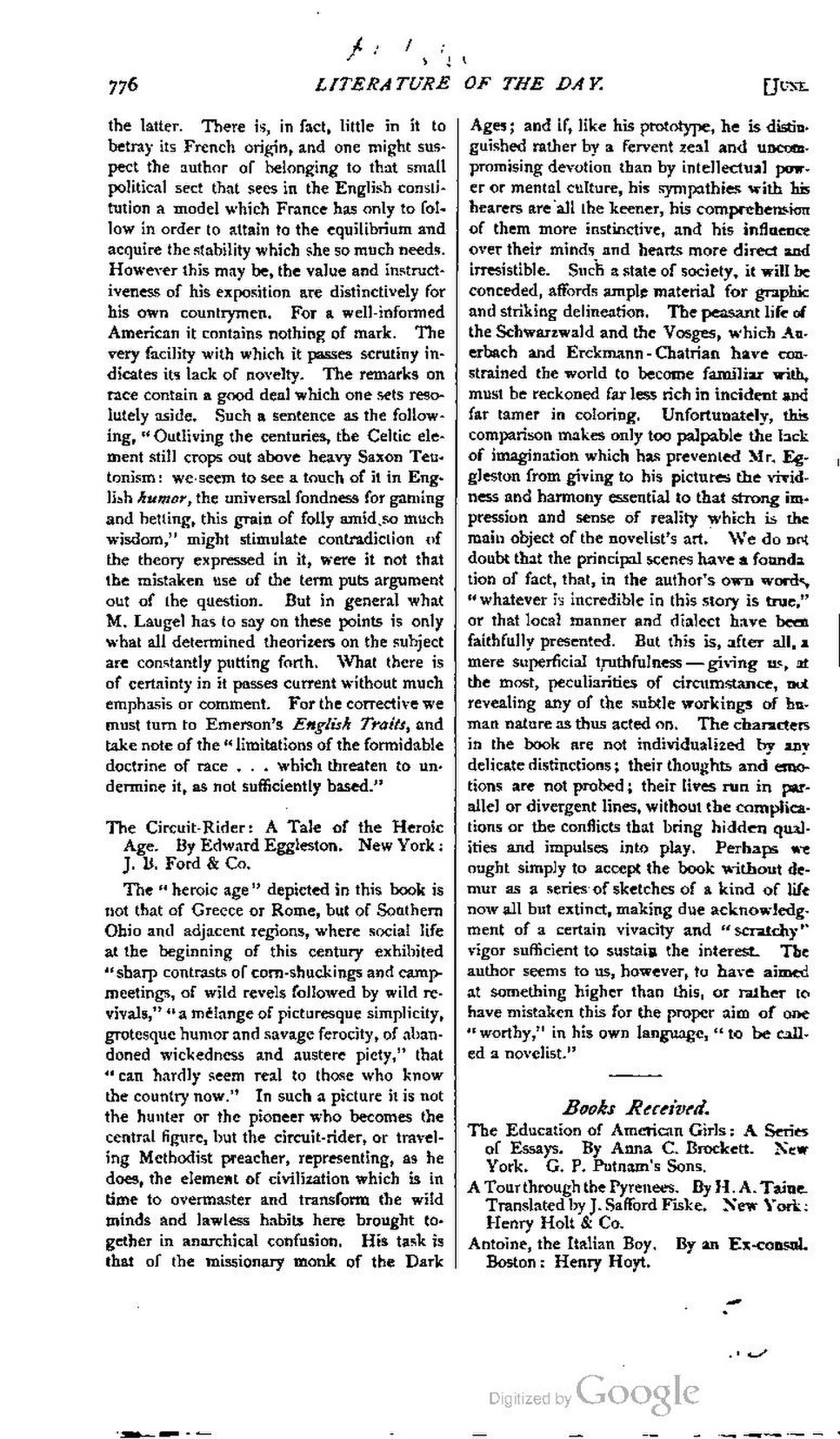the latter. There is, in fact, little in it to betray its French origin, and one might suspect the author of belonging to that small political sect that sees in the English constitution a model which France has only to follow in order to attain to the equilibrium and acquire the stability which she so much needs. However this may be, the value and instructiveness of his exposition are distinctively for his own countrymen. For a well-informed American it contains nothing of mark. The very facility with which it passes scrutiny indicates its lack of novelty. The remarks on race contain a good deal which one sets resolutely aside. Such a sentence as the following, "Outliving the centuries, the Celtic element still crops out above heavy Saxon Teutonism: we seem to see a touch of it in English humor, the universal fondness for gaming and betting, this grain of folly amid so much wisdom," might stimulate contradiction of the theory expressed in it, were it not that the mistaken use of the term puts argument out of the question. But in general what M. Laugel has to say on these points is only what all determined theorizers on the subject are constantly putting forth. What there is of certainty in it passes current without much emphasis or comment. For the corrective we must turn to Emerson's English Traits, and take note of the " limitations of the formidable doctrine of race … which threaten to undermine it, as not sufficiently based."
The "heroic age" depicted in this book is not that of Greece or Rome, but of Southern Ohio and adjacent regions, where social life at the beginning of this century exhibited "sharp contrasts of corn-shuckings and camp-meetings, of wild revels followed by wild revivals," "a mélange of picturesque simplicity, grotesque humor and savage ferocity, of abandoned wickedness and austere piety," that "can hardly seem real to those who know the country now." In such a picture it is not the hunter or the pioneer who becomes the central figure, but the circuit-rider, or traveling Methodist preacher, representing, as he does, the element of civilization which is in time to overmaster and transform the wild minds and lawless habits here brought together in anarchical confusion. His task is that of the missionary monk of the Dark Ages; and if, like his prototype, he is distinguished rather by a fervent zeal and uncompromising devotion than by intellectual power or mental culture, his sympathies with his hearers are all the keener, his comprehension of them more instinctive, and his influence over their minds and hearts more direct and irresistible. Such a state of society, it will be conceded, affords ample material for graphic and striking delineation. The peasant life of the Schwarzwald and the Vosges, which Anerbach and Erckmann-Chatrian have constrained the world to become familiar with, must be reckoned far less rich in incident and far tamer in coloring. Unfortunately, this comparison makes only too palpable the lack of imagination which has prevented Mr. Eggleston from giving to his pictures the vividness and harmony essential to that strong impression and sense of reality which is the main object of the novelist's art. We do not doubt that the principal scenes have a foundation of fact, that, in the author's own words "whatever is incredible in this story is true," or that local manner and dialect have been faithfully presented. But this is, after all, a mere superficial truthfulness—giving as at the most, peculiarities of circumstance, not revealing any of the subtle workings of human nature as thus acted on. The characters in the book are not individualized by any delicate distinctions; their thoughts and emotions are not probed; their lives run in parallel or divergent lines, without the complications or the conflicts that bring hidden qualities and impulses into play. Perhaps we ought simply to accept the book without demur as a series of sketches of a kind of life now all but extinct, making due acknowledgment of a certain vivacity and "scratchy" vigor sufficient to sustain the interest. The author seems to us, however, to have aimed at something higher than this, or rather to have mistaken this for the proper aim of one "worthy," in his own language, "to be called a novelist."
Books Received.
